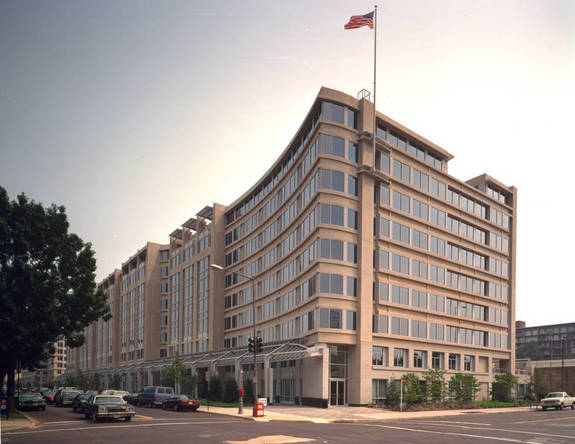Korean firm holds off on buying NASA building after Trump election shock
Nov 21, 2016 (Gmt+09:00)
2
Min read
Most Read
LG Chem to sell water filter business to Glenwood PE for $692 million


Kyobo Life poised to buy Japan’s SBI Group-owned savings bank


KT&G eyes overseas M&A after rejecting activist fund's offer


StockX in merger talks with Naver’s online reseller Kream


Mirae Asset to be named Korea Post’s core real estate fund operator


A South Korean asset manager has temporarily put on hold an acquisition of the NASA headquarters building in Washington D.C., after rising interest rates and the weakening Korean won drove financing costs for the estimated 400 billion won ($340 million) deal, in the aftermath of Donald Trump’s surprising election win.
The transaction, for which KTB Asset Management Co. Ltd. was chosen as the preferred buyer last month, is among the first to face a delay or come to a halt for South Korean investors after the U.S. presidential election results roiled global financial markets.

According to investment banking sources on Nov. 20, KTB Asset has been delaying the down payment to monitor market conditions, after interest rates on senior loans secured by U.S. property recently climbed to 3.5% from 2.9% last month. Considering the borrowing costs, the expected return on the acquisition would be down by 0.4% points from the earlier projection of about 5.5% a year. KTB Asset had aimed to sign a definitive agreement this month.
To fund the acquisition, the South Korean asset manager had planned to raise a total of 180 billion won from domestic brokerage companies, while borrowing senior loans from U.S. lenders. The building has been used by the National Aeronautics and Space Administration (NASA) for 26 years.
Meanwhile, a leading South Korean brokerage house, which was selected as the preferred buyer of an unidentified insurance company’s headquarters building in London about two months ago, has yet to close the acquisition. The selling side is dragging its feet in sealing the contract, demanding a higher price as capital inflows into Europe accelerated from the U.S. markets. The brokerage company declined to be identified.
Because of lowered expected returns on global assets, domestic investment firms also are struggling to sell down offshore alternative assets they have bought to institutional investors. Industry watchers estimated that six to seven offshore alternative deals involving South Korean firms are being delayed in attracting new investors.
Separately, South Korea’s Military Mutual Aid Association has recently shelved a planned commitment to a renewable energy fund being raised by a leading U.S. investment firm, after president-elect Trump vowed to support fossil fuels and cut subsidies for renewable energy.
By Taeho Kim and Daehun Kim
highkick@hankyung.com
The transaction, for which KTB Asset Management Co. Ltd. was chosen as the preferred buyer last month, is among the first to face a delay or come to a halt for South Korean investors after the U.S. presidential election results roiled global financial markets.

According to investment banking sources on Nov. 20, KTB Asset has been delaying the down payment to monitor market conditions, after interest rates on senior loans secured by U.S. property recently climbed to 3.5% from 2.9% last month. Considering the borrowing costs, the expected return on the acquisition would be down by 0.4% points from the earlier projection of about 5.5% a year. KTB Asset had aimed to sign a definitive agreement this month.
To fund the acquisition, the South Korean asset manager had planned to raise a total of 180 billion won from domestic brokerage companies, while borrowing senior loans from U.S. lenders. The building has been used by the National Aeronautics and Space Administration (NASA) for 26 years.
Meanwhile, a leading South Korean brokerage house, which was selected as the preferred buyer of an unidentified insurance company’s headquarters building in London about two months ago, has yet to close the acquisition. The selling side is dragging its feet in sealing the contract, demanding a higher price as capital inflows into Europe accelerated from the U.S. markets. The brokerage company declined to be identified.
Because of lowered expected returns on global assets, domestic investment firms also are struggling to sell down offshore alternative assets they have bought to institutional investors. Industry watchers estimated that six to seven offshore alternative deals involving South Korean firms are being delayed in attracting new investors.
Separately, South Korea’s Military Mutual Aid Association has recently shelved a planned commitment to a renewable energy fund being raised by a leading U.S. investment firm, after president-elect Trump vowed to support fossil fuels and cut subsidies for renewable energy.
By Taeho Kim and Daehun Kim
highkick@hankyung.com
Yeonhee Kim edited this article
More to Read
-
 Real estateMirae Asset to be named Korea Post’s core real estate fund operator
Real estateMirae Asset to be named Korea Post’s core real estate fund operatorApr 29, 2025 (Gmt+09:00)
-
 Asset managementMirae Asset bets on China as Korean investors’ US focus draws concern
Asset managementMirae Asset bets on China as Korean investors’ US focus draws concernApr 27, 2025 (Gmt+09:00)
-
 Alternative investmentsMeritz backs half of ex-manager’s $210 mn hedge fund
Alternative investmentsMeritz backs half of ex-manager’s $210 mn hedge fundApr 23, 2025 (Gmt+09:00)
-
 Real estateRitz-Carlton to return to Seoul, tapped by IGIS Asset for landmark project
Real estateRitz-Carlton to return to Seoul, tapped by IGIS Asset for landmark projectApr 22, 2025 (Gmt+09:00)
-
 Real estateS.Korean gaming giant Netmarble eyes headquarters building sale
Real estateS.Korean gaming giant Netmarble eyes headquarters building saleApr 18, 2025 (Gmt+09:00)
Comment 0
LOG IN


